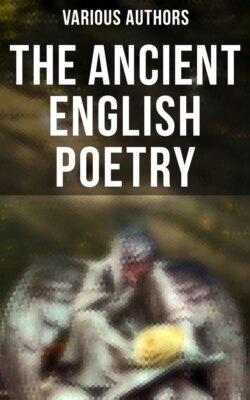Читать книгу The Ancient English Poetry - Various Authors - Страница 55
На сайте Литреса книга снята с продажи.
III.
JEPHTHAH JUDGE OF ISRAEL.
ОглавлениеTable of Contents
In Shakespeare's Hamlet, act ii. the hero of the play takes occasion to banter Polonius with some scraps of an old Ballad, which has never appeared yet in any collection: for which reason, as it is but short, it will not perhaps be unacceptable to the reader; who will also be diverted with the pleasant absurdities of the composition. It was retrieved from utter oblivion by a lady, who wrote it down from memory as she had formerly heard it sung by her father. I am indebted for it to the friendship of Mr. Steevens.
It has been said, that the original Ballad, in black-letter, is among Anthony à Wood's Collections in the Ashmolean Museum. But, upon application lately made, the volume which contained this Song was missing, so that it can only now be given as in the former Edition.
The Banter of Hamlet is as follows:
"Hamlet. 'O Jeptha, Judge of Israel,' what a treasure hadst thou?
Polonius. What a treasure had he, my Lord?
Ham. Why, 'One faire daughter, and no more, the which he loved passing well.'
Polon. Still on my daughter.
Ham. Am not I i' th' right, old Jeptha?
Polon. If you call me Jeptha, my Lord, I have a daughter, that I love passing well.
Ham. Nay, that follows not.
Polon. What follows then, my Lord?
Ham. Why, 'As by lot, God wot:' and then you know, 'It came to passe, As most like it was.' The first row of the pious chanson will shew you more."—Act ii. sc. 2.
[A more perfect copy of this ballad was reprinted by Evans in his Collection of Old Ballads from a black-letter broadside, and is included by Child in his Collection of English and Scottish Ballads (vol. viii. p. 198).
The wording is rather different in the two versions, and Evans's has two additional stanzas. It does not appear that anything is left out at line 18 of Percy's version, but in place of the stars at line 41 Evans's copy reads—
"A sacrifice to God on high;
My promise must be finishéd."]
Have you not heard these many years ago
Jeptha was judge of Israel?
He had one only daughter and no mo,
The which he loved passing well:
And, as by lott,5
God wot,
It so came to pass,
As Gods will was,
That great wars there should be,
And none should be chosen chief but he10
And when he was appointed judge,
And chieftain of the company,
A solemn vow to God he made;
If he returned with victory,
At his return15
To burn
The first live thing,
* * * * *
That should meet with him then,
Off his house, when he should return agen.20
It came to pass, the wars was oer,
And he returned with victory;
His dear and only daughter first of all
Came to meet her father foremostly:
And all the way25
She did play
On tabret and pipe,
Full many a stripe,
With note so high,
For joy that her father is come so nigh.30
But when he saw his daughter dear
Coming on most foremostly,
He wrung his hands, and tore his hair,
And cryed out most piteously;
Oh! it's thou, said he,35
That have brought me
Low,
And troubled me so,
That I know not what to do.
For I have made a vow, he sed,
The which must be replenished:40
* * * * *
"What thou hast spoke
Do not revoke:
What thou hast said,
Be not affraid;45
Altho' it be I;
Keep promises to God on high.
But, dear father, grant me one request,
That I may go to the wilderness,
Three months there with my friends to stay;50
There to bewail my virginity;
And let there be,
Said she,
Some two or three
Young maids with me."55
So he sent her away,
For to mourn, for to mourn, till her dying day.
